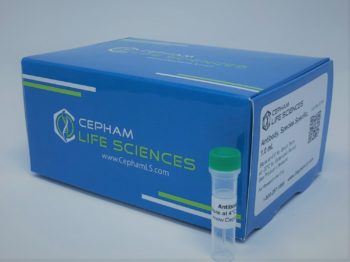Description
Aliases
ISGF-3; STAT91;
Antibody Type
Polyclonal Antibody
Uniprot ID
Swiss-Prot: P42224
NCBI Protein: NP_009330.1
Immunogen
Peptide sequence around phosphorylation site of serine 727 (P-M-S(p)-P-E) derived from Human STAT1.
Raised In
Rabbit
Species Reactivity
Human Mouse Rat
Tested Applications
WB IHC IF Recommended dilution: Predicted MW: 91kd, Western blotting: 1:500~1:1000, Immunohistochemistry: 1:50~1:100, Immunofluorescence: 1:100~1:200
Background / Function
Signal transducer and activator of transcription that mediates signaling by interferons (IFNs). Following type I IFN (IFN-a and IFN-beta) binding to cell surface receptors, Jak kinases (TYK2 and JAK1) are activated, leading to tyrosine phosphorylation of STAT1 and STAT2. The phosphorylated STATs dimerize, associate with ISGF3G/IRF-9 to form a complex termed ISGF3 transcription factor, that enters the nucleus. ISGF3 binds to the IFN stimulated response element (ISRE) to activate the transcription of interferon stimulated genes, which drive the cell in an antiviral state. In response to type II IFN (IFN-gamma), STAT1 is tyrosine- and serine-phosphorylated. It then forms a homodimer termed IFN-gamma-activated factor (GAF), migrates into the nucleus and binds to the IFN gamma activated sequence (GAS) to drive the expression of the target genes, inducing a cellular antiviral state. Yuan ZM, et al. (1999) Nature.399 (6738): 814-817.Schindler C, et al. (1992) Proc. Natl. Acad. Sci. U.S.A 89:7836-7839.Strausberg R.L (2002). Proc. Natl. Acad. Sci. U.S.A. 99:16899-16903.Quelle F.W., (1995) J. Biol. Chem. 270:20775-20780.
Conjugate
Unconjugated
Storage Buffer
Supplied at 1.0mg/mL in phosphate buffered saline (without Mg2+ and Ca2+), pH 7.4, 150mM NaCl, 0.02% sodium azide and 50% glycerol.
Form
liquid
Storage
Shipped at 4°C. Upon delivery aliquot and store at -20°C or -80°C. Avoid repeated freeze.
Purity
Antibodies were produced by immunizing rabbits with synthetic phosphopeptide and KLH conjugates. Antibodies were purified by affinity-chromatography using epitope-specific phosphopeptide. Non-phospho specific antibodies were removed by chromatogramphy using non-phosphopeptide.
Modification
Phospho-Ser727
Additional information
| Size | 100?l |
|---|


